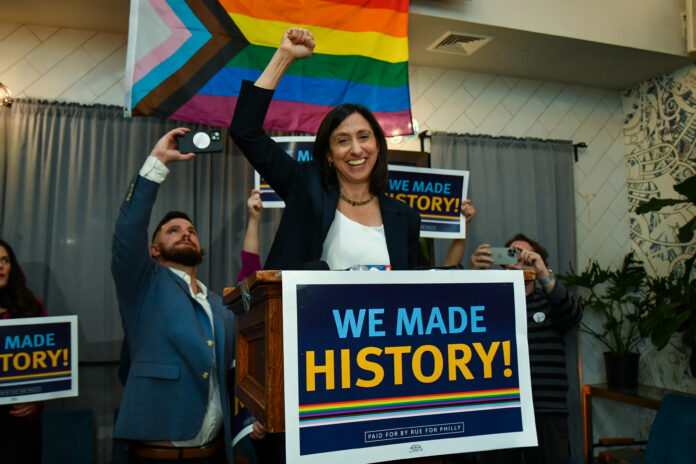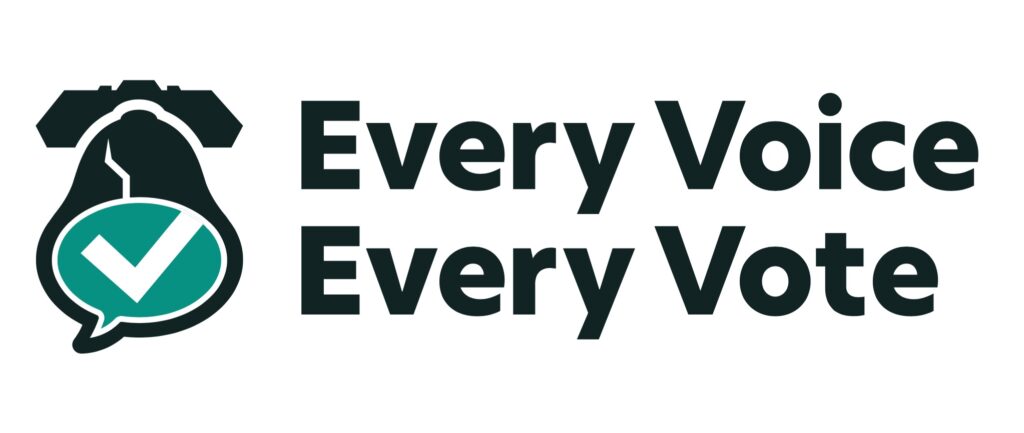
It was an historic night in Philadelphia Tuesday: Voters elected the city’s 100th mayor and first woman, Cherelle Parker, and voters also remade City Council to look more like Philadelphia.
When Rue Landau and Nina Ahmad are sworn in come January, Landau will become the first openly LGBTQ+ member of City Council, and Ahmad will become the first South Asian member and the first immigrant in decades.
In addition to these historic wins, Kendra Brooks was re-elected and Nicolas O’Rourke was elected to fill two at-large Council seats. Both Brooks and O’Rourke are members of the progressive Working Families Party and their election ousted Republicans from those seats. Since David Oh resigned from Council to run for mayor, this means for the first time in Democratic-run Philadelphia, there will be no Republicans serving on City Council in at-large seats, which traditionally have gone to the GOP.
Five Democrats and the two Working Families Party candidates won the at-large races, with incumbents Isaiah Thomas, Katherine Gilmore Richardson and Jim Harrity filling out those seats. The ousting of Republicans leaves longtime incumbent Brian O’Neill, who won re-election against Democratic challenger labor leader Gary Masino, as the sole Republican in the chamber.
With Tuesday’s election, Council looks younger, more progressive and more attuned to the crises facing the city. Landau and Ahmad will represent large Philadelphia constituencies which have never had a voice from their own communities speaking for them.
In her acceptance speech delivered at Cockatoo in the heart of the Gayborhood, Landau thanked her “lovely wife, Kerry [Smith]” and PGN publisher Mark Segal first. Then she said, “I have three simple and powerful words for you,” as she shouted “We did it!” to a cheering crowd of supporters. Landau continued, “I am so humbled and honored to announce that I am the first openly LGBTQ person ever elected to Philadelphia City Council. This is a moment of immense pride and joy.”
In a long and enthusiastic speech filled with reminiscences of who she met as she campaigned and those who supported her, Landau thanked the community and all those who blazed the trail to full visibility before her, which includes Sherrie Cohen, lesbian daughter of longtime Councilmember David Cohen, who had run for Council several times, but was never able to garner sufficient votes — or as Landau noted, “make it over the finish line.”
Landau mentioned a long list of Democratic leaders and politicians who supported her campaign, as well as her family, but gave a poignant credit to past Council members, saying, “I would like to take a moment to acknowledge the giants, whose shoulders I stand on now: John C. Anderson and Dr. Ethel Allen, the LGBTQ Council members who were not out during their political careers.”
She added, she wished she could “share this moment with one of my dearest friends and personal heroes and mentors — Gloria Casarez.” Casarez served as Philadelphia’s first director for the Office of LGBT Affairs and died in 2014 at age 42 of metastatic breast cancer.
Landau said that her win was emblematic of a larger moment, not just about her and her campaign. She said, “It’s about our collective journey. It’s about the LGBTQ community, a community that has faced discrimination for far too long. It’s about a city that has been at the forefront in LGBTQ legal protections with a politically active and reliable Democratic voting bloc, but has not been able to get one of us across the finish line until now.”
She added, referencing Harrisburg’s and the national GOP’s assault on the LGBTQ community, “And it’s about sending a message to the world that love, acceptance and unity can triumph over division and fear.”
For Nina Ahmad, the journey to City Council has been part of a larger path from her country of origin — Bangladesh, which she left at 21 to come to the U.S. on her own, after living through the Bangladesh Liberation War. She settled in Philadelphia after pursuing a doctorate in chemistry from the University of Pennsylvania.
Ahmad has run for other offices in Pennsylvania: She was the Democratic nominee for the 2020 Pennsylvania Auditor General election, which she lost to Republican Timothy DeFoor. She previously ran for Lieutenant Governor in 2018, but lost in the Democratic primary to John Fetterman. Ahmad spent more than $1 million on those campaigns, money she said was necessary because visibility is so difficult to attain and legacy politics is part of how people from historically marginalized communities get shut out of mainstream politics and the voice that comes with that.
Ahmad became the first Bangladeshi-American to be appointed to a position in the Obama Administration when President Barack Obama appointed her to the Commission on Asian Americans and Pacific Islanders in 2014, while she also served on then-Mayor Michael Nutter’s commission on Asian American Affairs. And she was Deputy Mayor of Philadelphia for Public Engagement under Mayor Kenney from January 2016 through November 2017. Ahmad also was president of the Philadelphia chapter of NOW.
At her victory party at the Marriott Old City, Ahmad said, “I am feeling very good. I’m very grateful to the voters of Philadelphia for once again believing in me.” About 17% of Philadelphians are immigrants, yet there have been no immigrants on Council in decades — so that’s another constituency Ahmad represents.
Ahmad said she “spent the day thanking poll workers,” who she called “frontline soldiers keeping our democracy sacred.”
In a post-victory interview with City & State, Ahmad said, “You know, what this win means to me is that when you speak a little different, look a little different, if you connect with people and persevere, you can make a difference and you can arrive in places that were not meant for you. I have something to offer — and people have finally decided, ‘Yes, let’s give her a shot at it.’”
The Inquirer quoted Ahmad saying that it’s essential to get people in under-represented and historically marginalized communities elected.
“People are understanding that in order to get adequate resources, you have to have political power and have connections to legislators, or whoever makes those decisions,” Ahmad said. “And the other realization that has happened, I believe, is if you vote, people pay attention to you. They look [at] who the voters are.”
Brooks and O’Rourke gave victory speeches at a joint party at Roar Nightclub in Northern Liberties. Video posted on Twitter/X showed an excited crowd. Among the supporters at the party were District Attorney Larry Krasner and State Representative Chris Rabb.
Brooks came on stage to calls of “Minority Party Leader,” and soon led the crowd in a call and response chant: “When I say ‘Working Families’… You say ‘Party!”
O’Rourke took the stage with a similar chant and the crowd erupted.
“I. I believe. I believe that we will win!” He started again, bringing the place to its feet: “I. I believe. I believe that we HAVE WON!”
Philadelphia voters are overwhelmingly Democratic. As of Monday, per state data, there were about 778,000 registered Democrats versus 116,000 Republicans — a nearly 7 to 1 ratio. There are also about 113,000 registered voters with no party affiliation.
Brooks and O’Rourke had massive grassroots support for their candidacies and were endorsed by Sen. John Fetterman and Gov. Josh Shapiro amidst warnings from city Democratic chair Bob Brady to expel ward committee people who openly endorsed Brooks or O’Rourke.
City Council will be more like Philly come January. As Landau said, “Together, we can overcome any challenge and build a more inclusive and just Philadelphia. This victory belongs to all of us. And together we’ll continue to make history in the true spirit of Philadelphia. Thank you again and let’s continue this journey together.”

